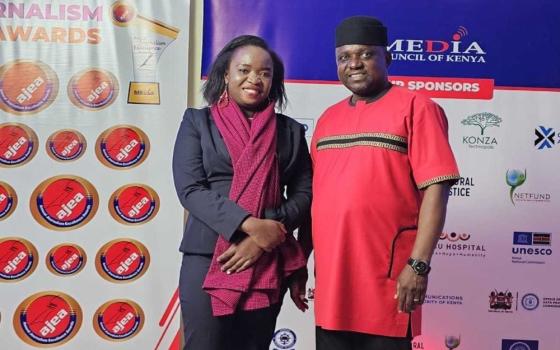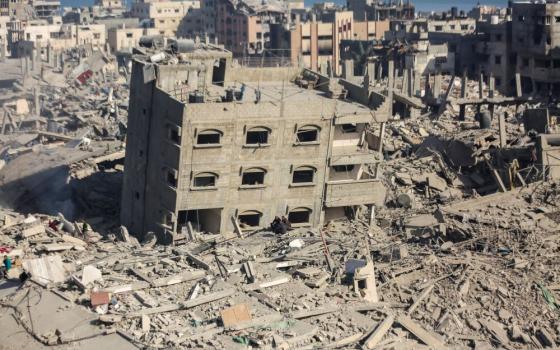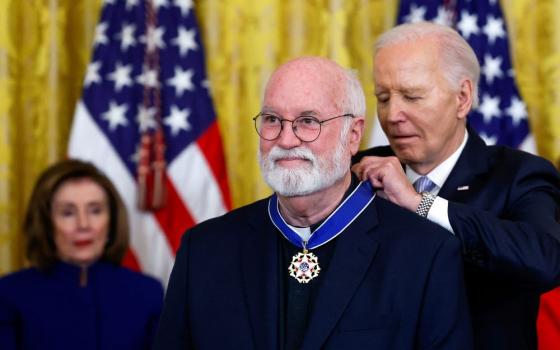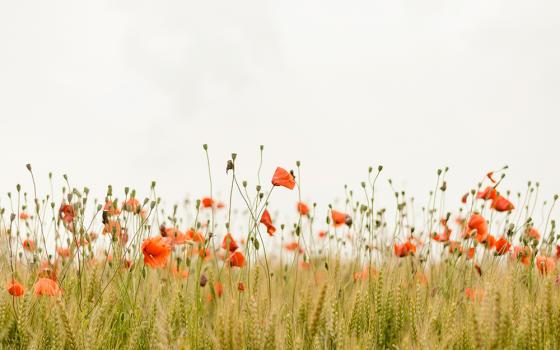Auxiliary Bishop Maksym Ryabukha of Donetsk, Ukraine, poses for a photo in the chapel of the Ukrainian Pontifical College of St. Josaphat in Rome Sept. 8, 2023. (CNS photo/Justin McLellan)
Since Auxiliary Bishop Maksym Ryabukha of Donetsk was installed in December 2022, 10 months into Russia's full-scale invasion of Ukraine, he has driven more than 30,000 miles near the largely occupied areas of Eastern Ukraine to tend to his flock -- and he feels right at home.
"All my life as a religious, as a priest for the last 16 years, has been a life of the peripheries, with young people and with ordinary people, so even now I feel at home in whatever situation and finding whatever way to look for, to meet, see and communicate with my spiritual family," the Salesian told Catholic News Service Sept. 7 while in Rome for the annual synod of Ukrainian Catholic bishops.
Through streamed liturgies and messages conveyed through local priests and in parish group chats, Ryabukha has managed to create a connection with those in inaccessible regions. One Catholic in an occupied zone told a local priest, "We don't know our auxiliary bishop, but just the fact that he always remembers us and says hello to us makes us hold him in high regard already," the bishop told CNS.
The bishops and priests of the Exarchate of Donetsk cannot reach its parishes and people in the Russian-occupied territories, where Catholic priests have been expelled and two have been imprisoned since November 2022.
But in Ukrainian-held territory, it celebrates liturgies outdoors and in military barracks, often with the din of bombs falling nearby. Soldiers and civilians, Christians and nonbelievers alike, the bishop said, attend Divine Liturgy as a spiritual reprieve from the cruelty of the war. He shared "little miracles" from his wartime ministry with CNS, such as intense bombing falling silent just before a liturgy or the water and wine used for consecration staying liquid during a celebration held in subfreezing temperatures in a tent.
Ryabukha was one of 45 bishops who traveled to Rome for the Ukrainian church's annual synod and to meet with Pope Francis and other Vatican officials. The pope assured them of his support for Ukraine and addressed comments he made praising the cultural fruits of the Russian Empire which sparked backlash.
"People's esteem for the pope is very fragile" in Eastern Ukraine, the bishop told CNS. "Sensitivity levels are at their highest in the most intense situations, so right now each word has a very heavy weight behind it."
While Pope Francis has repeatedly spoken out on behalf of the "martyred Ukraine," he told young Russian Catholics Aug. 25 to be proud of their heritage as heirs of the "the great Russia" led by Peter the Great and Catherine II, both of whom launched conquests to expand Russia's borders.
Meeting the Ukrainian bishops Sept. 6, the pope reiterated his explanation that he was praising Russia's cultural and not imperial legacy, but he conceded that his phrasing may not have been the best. Yet Pope Francis told the bishops in no unclear terms: "I am with the Ukrainian people."
In a physical sign of his support, Pope Francis gave the bishops copies of the 226 statements he has made mentioning Ukraine since the Russian invasion in February 2022.
Advertisement
"We feel that the pope is very aware of what is happening in Ukraine, and even more so we are very aware of his affection for our land and our people," Ryabhuka said the day after his meeting with the pope. But the bishop also said, "Ordinary people don't have the time to think about who says or who doesn't say something, because in their daily lives they are trying to survive bombings."
"When you don't have the explanation, but you hear words that, for us, express very clear ideas, then you wonder 'who is with us and who is against us?'" he said.
In Rome, the bishops also met with Cardinals Pietro Parolin, Vatican secretary of state; Kurt Koch, prefect of the Dicastery for Promoting Christian Unity; Claudio Gugerotti, prefect of the Dicastery for Eastern Churches; and Matteo Zuppi, archbishop of Bologna and Pope Francis' peace envoy.
Archbishop Borys Gudziak, the Ukrainian Catholic archbishop of Philadelphia, told CNS Sept. 7 that he asked Pope Francis and other cardinals about organizing a "concerted, international, Catholic effort to help heal the spiritual, psychological and physical wounds" of Ukrainians still in the country or seeking asylum abroad by "accessing what Catholics in different countries can reach in terms of government and humanitarian resources."
"Everybody is helping, but there is more need for coordination, and things need to be done in Ukraine," he said.











